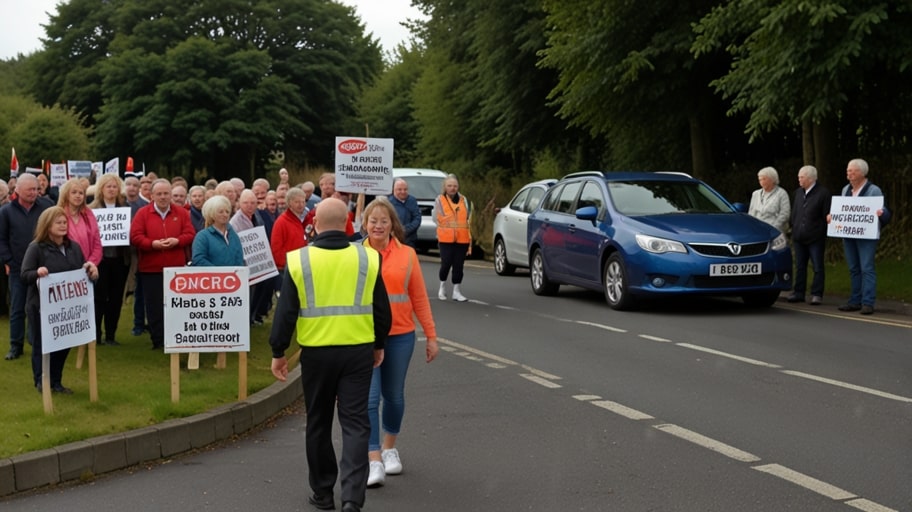
Speed Limit Changes in Wrexham
The move by Wrexham to re-provision the road to 30mph after a 20mph initiative has set off a furious debate. In 2023, the 20mph speed limit was introduced as an experiment to increase safety, but faced popular opposition, leading the council to partially reverse this decision.
Why the Change?
By September 2023, the Welsh government had implemented a 20mph default speed limit, which had been criticized for slowing traffic and causing annoyance to drivers. Wrexham Council based its decisions on the responses of the residents, having determined some important roads, where 30mph is much more appropriate to the needs of locals.
Which Roads Are Affected?
Announced in June 2025, the rollback will see 52 routes being targeted, including key routes such as Mold Road and Holt Road. These improvements aim to enhance safety and facilitate efficient travel, particularly for commuters and business professionals.
Implementation Delays
The transition is delayed beyond its initial deadline of June 30, 2025. Now, Wrexham Council is looking forward to works extending into July due to logistical issues surrounding the change of signage and road markings.
Scattered Public Opinion
Dwellers are divided. Others rejoice about going back to 30mph as the traffic is smoother, and others point out that the 20 mph limit lessened the number of accidents and guarded the pedestrians, particularly in schools and residential zones.
Issues of Safety Concerns Ensued
Those critical of the reversal point to the fact that Wales has 2023 data indicating a 20 percent reduction in road casualties with the 20mph limit. Increased speed poses a fear of losing the advantages gained and putting the vulnerable road users at risk.
Business and Commuter Effect
The changes have been met with cheers by local businesses, especially those that depend on deliveries. Motorists have reported that congestion has been reduced on major routes, but they fear that they may spend more time on the 20mph roads that still exist.
Mother Balancing Act Council
Wrexham Council is claiming that the roll back will be specific, and 20mph speed limits will be kept in sensitive zones such as school zones. The selective style will still deal with the queries of the people and at the same time focus on safety where it is most required.
Position of the Government of Welsh
Initially, the government of Wales was a strong proponent of the 20mph speed limit policy, but it has since toned down its support, giving local councils more flexibility to set limits according to the needs of their areas. This was done after massive demonstrations in Wales.
Community Outreach Work
Wrexham Council conducted consultations before making changes to fine-tune it, and residents and businesses were consulted. The exercise showed there were severe schisms as more than 60 percent of the respondents supported a partial move to commencing 30mph.
Environmental Questions
The environmentalists doubt the effects of the rollback. Faster speeds may lead to more emissions, which defeats the net-zero ambitions in Wales. Nevertheless, the argument could be countered by the council that some environmental issues would be addressed.
Enforcement Challenges
Respecting certain speed limits is a challenge for police. As the restriction of some roads has been returned to 30mph, it may, as suggested, increase the number of patrols and raise the awareness of drivers in and around the areas of Wrexham, which have a variety of 30mph, 40mph, 20mph, and 70mph.
Political Ramifications
The speed limit saga has become a political hot point. The campaign puts pressure on local councillors as both the anti 20mph and pro 20mph groups tend to influence future elections.
Residents Voices
Motorists, such as Sarah Evans, who commutes to Wrexham, are delighted at the 30mph speed limit and argue it saves them time. In the meantime, parent Tom Hughes expresses his concerns about safety around the school in which his children attend and on which 20mph speed limit is still operating.
Comparisons with other Regions
The strategy of Wrexham follows actions in other Welsh councils, such as Flintshire, which returned some roads to 30mph. This is the sign of increasing opposition to blanket 20mph schemes in Wales.
The Future of Speed Limits
The transitions in Wrexham could lead to a precedent. Other councils are not resting on their laurels, and rollbacks are possible as long as public opinion and statistics allow increased limits.
Ongoing Monitoring
The council intends to monitor the accident rate and traffic flow after the reversal. The earliest data will play a valuable role in determining whether the 30mph reinstatement is meeting the intended balance.
Educating the Society
Wrexham Council is also starting a campaign to notify drivers about the changes in order to make the transition easier. New boards and electronic messages will be put in place to avoid congestion on the affected roads.
A Fractured Course To The Future
The speed limit revisions in Wrexham are a sign of a broader debate over safety, efficiency, and public opinion. The council walks on a thin line as it seeks to please all parties involved in the debate.
What Lies Ahead for Wrexham?
As changes are still taking place, Wrexham roads are an experimental area of the speed limit policy. The result would define how Wales can negotiate urban mobility and safety in the coming years.



 Bitcoin
Bitcoin  Ethereum
Ethereum  Tether
Tether  XRP
XRP  USDC
USDC  Solana
Solana  TRON
TRON  Lido Staked Ether
Lido Staked Ether  Cardano
Cardano  Avalanche
Avalanche  Toncoin
Toncoin